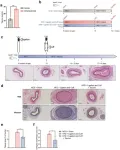KEY TAKEAWAYS
Researchers from Mass General Brigham and collaborators assessed national trends in the number of patients with obesity prescribed GLP-1 drugs and the number who underwent metabolic bariatric surgery. Researchers documented a 132.6% increase in patients prescribed GLP-1 drugs between 2022 and 2023, and a 25.6% decrease in patients undergoing bariatric surgery. Only 6% of patients with obesity in the study population received either GLP-1 drugs or surgery, suggesting that many more patients could be receiving treatment. A new study by researchers at Brigham and Women’s Hospital, a founding member of the Mass General Brigham healthcare system, in collaboration with researchers at Harvard T.H. Chan School of Public Health and the Brown School of Public Health, examined a large sample of privately insured patients with obesity and found that use of glucagon-like peptide-1 receptor agonists (GLP-1 RAs) as anti-obesity medications more than doubled from 2022 to 2023. During the same period, there was a 25.6% decrease in patients undergoing metabolic bariatric surgery to treat obesity. The study is published in JAMA Network Open.
“Our study provides one of the first national estimates of the decline in utilization of bariatric metabolic surgery among privately insured patients corresponding to the rising use of blockbuster GLP-1 RA drugs,” said senior author Thomas C. Tsai, MD, MPH, a metabolic bariatric surgeon in the Department of Surgery at Brigham and Women’s Hospital.
Using a national sample of medical insurance claims data from over 17 million privately insured adults, the researchers identified patients with a diagnosis of obesity without diabetes in 2022-2023. The study found a sharp increase in the share of patients who received GLP-1 RAs during the study period, with GLP-1 RA use increasing 132.6% from the last six months of 2022 to the last six months of 2023 (from 1.89 to 4.41 patients per 1,000 patients). Meanwhile, there was a 25.6% decrease in use of bariatric metabolic surgery during the same period (from 0.22 to 0.16 patients per 1,000 patients).
Among the sample of patients with obesity, 94.7% received neither form of treatment during the study period (while 5.0% received GLP-1 RAs and 0.3% received surgery). Compared to patients who were prescribed GLP-1 RAs, patients who underwent surgery tended to be more medically complex.
“For now, metabolic bariatric surgery remains the most effective and durable treatment for obesity. National efforts should focus on improving access to obesity treatment—whether pharmacologic or surgical—to ensure patients can receive optimal care,” said Tsai, who is also an assistant professor of Surgery at Harvard Medical School and an assistant professor in Health Policy and Management at Harvard T.H Chan School of Public Health.
Tsai notes that while GLP-1 RAs can effectively treat obesity and related conditions (such as diabetes), these medications have been limited by high costs, limited supply, and gastrointestinal side effects that may prompt treatment cessation and subsequent weight regain.
“As patients with obesity increasingly rely on GLP-1s instead of surgical intervention, further research is needed to assess the impact of this shift from surgical to pharmacologic treatment of obesity on long-term patient outcomes,” Tsai said. “With the national decline in utilization of metabolic bariatric surgery and potential closure of bariatric surgery programs, there is a concern that access to comprehensive multidisciplinary treatment of obesity involving pharmacologic, endoscopic, or surgical interventions may become more limited.”
“These results also highlight an opportunity to further expand uptake of surgical and pharmacologic treatments for obesity and related comorbidities,” said co-author Ateev Mehrotra, MD, MPH, chair of the Department of Health Services, Policy and Practice at the Brown University School of Public Health. “Metabolic bariatric surgery and GLP-1 RAs are both effective interventions for patients with obesity, yet less than 6% of patients in our study received either form of treatment.”
Considering these results, the authors encourage clinicians and policymakers to continue to monitor access to effective obesity treatment amidst a rapidly evolving landscape of treatment options. In addition, further research is needed to understand the tradeoffs between use of surgical intervention versus increasingly popular GLP-1 RAs to treat obesity.
Authorship: Kevin Lin, Ateev Mehrota, and Thomas C. Tsai.
Funding/disclosures: Tsai reported receiving grants from the National Center for Advancing Translational Sciences, National Institutes of Health to Harvard Catalyst, the Harvard Clinical and Translational Science Center , and financial contributions from Harvard University and its affiliated academic health care centers.
Paper cited: Lin K et al. “Metabolic Bariatric Surgery in the Era of GLP-1 Receptor Agonists for Obesity Management” JAMA Network Open DOI: 10.1001/jamanetworkopen.2024.41380
For More Information:
Center for Weight Management and Wellness Study Shows Weight Loss Drug Decreases Heart Disease Risk Are Weight Loss Drugs Linked to Blindness? Is Medication for Weight Loss Right for Me?
###
About Mass General Brigham
Mass General Brigham is an integrated academic health care system, uniting great minds to solve the hardest problems in medicine for our communities and the world. Mass General Brigham connects a full continuum of care across a system of academic medical centers, community and specialty hospitals, a health insurance plan, physician networks, community health centers, home care, and long-term care services. Mass General Brigham is a nonprofit organization committed to patient care, research, teaching, and service to the community. In addition, Mass General Brigham is one of the nation’s leading biomedical research organizations with several Harvard Medical School teaching hospitals. For more information, please visit massgeneralbrigham.org.
END




